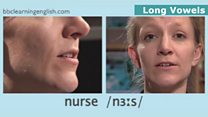Unit 29: Towards Advanced
Grammar, news, vocabulary and pronunciation
Select a unit
- 1 Towards advanced
- 2 Towards advanced
- 3 Towards advanced
- 4 Towards advanced
- 5 Towards advanced
- 6 Towards advanced
- 7 Towards advanced
- 8 Towards advanced
- 9 Towards Advanced
- 10 Towards Advanced
- 11 Towards Advanced
- 12 Towards Advanced
- 13 Towards Advanced
- 14 Towards Advanced
- 15 Towards Advanced
- 16 Towards Advanced
- 17 Towards Advanced
- 18 Towards Advanced
- 19 Towards Advanced
- 20 Towards Advanced
- 21 Towards Advanced
- 22 Towards Advanced
- 23 Towards Advanced
- 24 Towards Advanced
- 25 Towards Advanced
- 26 Towards Advanced
- 27 Towards Advanced
- 28 Towards Advanced
- 29 Towards Advanced
- 30 Towards Advanced
Session 5
Tim's Pronunciation Workshop: assimilation of /t/ and /j/
What happens when a word ends in /t/ and the next word begins with a /j/ sound?
Activity 1
Tim's Pronunciation Workshop: Assimilation of /t/ followed by /j/
He's gonna get you!
Tim's back in his pronunciation workshop. This time he's finding out about how the sound /t/ can change when it comes before a word starting with the sound /j/ - and hearing about what some Londoners say when they meet someone new...
To do
Take a look at the video, then try the activity to do some practice.
Watch the video and complete the activity

Tim
Hi. I'm Tim and this is my Pronunciation workshop. Here I'm going to show you how English is really spoken. Come on, let's go inside. When you meet someone for the first time, there are several things you can say. If you want to be formal, you could say 'How do you do?' But there is another, less formal expression. Do you know what it is? Let's meet some of the people of London.
Voxpops
It's nice to meet you.
Nice to meet you.
Nice to meet you.
It's nice to meet you.
Nice to meet you.
Tim
Well, it's nice to meet you too. Now, the word 'meet' ends in the sound /t/, and the word 'you' begins with /j/, don't they? Or do they? Listen again. What can you actually hear when these two sounds come together?
Voxpops
It's nice to meet you.
Nice to meet you.
Nice to meet you.
It's nice to meet you.
Nice to meet you.
Tim
In fluent speech, when one word ends in /t/ and the next begins with a /j/ sound, like 'you' or 'yours', then the two sounds come together and change to /ʧ/. So 'meet you' becomes /miːʧuː/. This is an example of assimilation. Now you might remember that in a previous video I mentioned that the /t/ sound can disappear in between two consonants. Well, this can still happen if the next word is 'you' or 'your', but it's more usual for the /t/ to change to /ʧ/ in this case. Here are some more examples.
Examples
That shirt won't suit you.
Don't you want to come to the party?
I bet your boss doesn’t know.
Can I get you anything?
Tim
Right, so you've heard the examples, and now it's your turn. Are you ready to start? Listen and repeat.
Examples
That shirt won't suit you.
Don’t you want to come to the party?
I bet your boss doesn’t know.
Can I get you anything?
Tim
Well done. Now remember, if you want to learn more about pronunciation, then please visit our website, bbclearningenglish.com. And that is about it from the pronunciation workshop for this week. I'll see you soon. Bye bye! Ugh. That is not right.
Tim
Hello.
Tom
Hello, is that Tim? It's Tom.
Tim
Oh hi, Tom. Yeah it's Tim.
Tom
So, did you enjoy your tea?
Tim
No. It was disgusting.
Tom
Ha ha, that's because I put salt in, instead of sugar - gotcha!
Tim
Why, you little... I'm gonna get you. I have a very particular set of skills. Skills that make me a nightmare for people like you. I will hunt you down. I will find you. And I will put shaving cream on your pillow. Brothers, eh?! Well I guess that goes to show that you can't always get what you want. Now, time to start plotting my revenge. Idiot.
To do
So that's a look at how the sound /t/ can combine with the sound /j/ and become /ʧ/ in phrases like meet you in natural English speech. Now try this activity to get some more practice.
The assimilation of /t/ followed by /j/ game
6 Questions
Which phrases have examples of /t/ followed by /j/ changing to /ʧ/? You decide...
Help
Activity
Which phrases have examples of /t/ followed by /j/ changing to /ʧ/? You decide...
Hint
When one word ends in /t/ and the next begins with a /j/ sound, like ‘you’ or ‘yours’, then the two sounds come together and change to /ʧ/.Question 1 of 6

Help
Activity
Which phrases have examples of /t/ followed by /j/ changing to /ʧ/? You decide...
Hint
When one word ends in /t/ and the next begins with a /j/ sound, like ‘you’ or ‘yours’, then the two sounds come together and change to /ʧ/.Question 2 of 6

Help
Activity
Which phrases have examples of /t/ followed by /j/ changing to /ʧ/? You decide...
Hint
When one word ends in /t/ and the next begins with a /j/ sound, like ‘you’ or ‘yours’, then the two sounds come together and change to /ʧ/.Question 3 of 6

Help
Activity
Which phrases have examples of /t/ followed by /j/ changing to /ʧ/? You decide...
Hint
When one word ends in /t/ and the next begins with a /j/ sound, like ‘you’ or ‘yours’, then the two sounds come together and change to /ʧ/.Question 4 of 6

Help
Activity
Which phrases have examples of /t/ followed by /j/ changing to /ʧ/? You decide...
Hint
When one word ends in /t/ and the next begins with a /j/ sound, like ‘you’ or ‘yours’, then the two sounds come together and change to /ʧ/.Question 5 of 6

Help
Activity
Which phrases have examples of /t/ followed by /j/ changing to /ʧ/? You decide...
Hint
When one word ends in /t/ and the next begins with a /j/ sound, like ‘you’ or ‘yours’, then the two sounds come together and change to /ʧ/.Question 6 of 6

Excellent! Great job! Bad luck! You scored:
End of Unit 29
We hope that was useful. In Unit 30, Dan has a Masterclass on aspect. In News Review and LingoHack you can find out which words are making the headlines - and Tim will be back with a very special pronunciation workshop. See you there!
Session Vocabulary
Assimilation of /t/ and /j/ to /ʧ/
When we pronounce the sound /t/ and it comes before a word that starts with the sound /j/, then these two sounds can come together and change to the sound /ʧ/. This is like the sound made by the letters ch in church.
- Did you like the present I got you for your birthday?
- Have you been to that new restaurant yet? It's fantastic – we went yesterday.
- Won't you come to the party?


